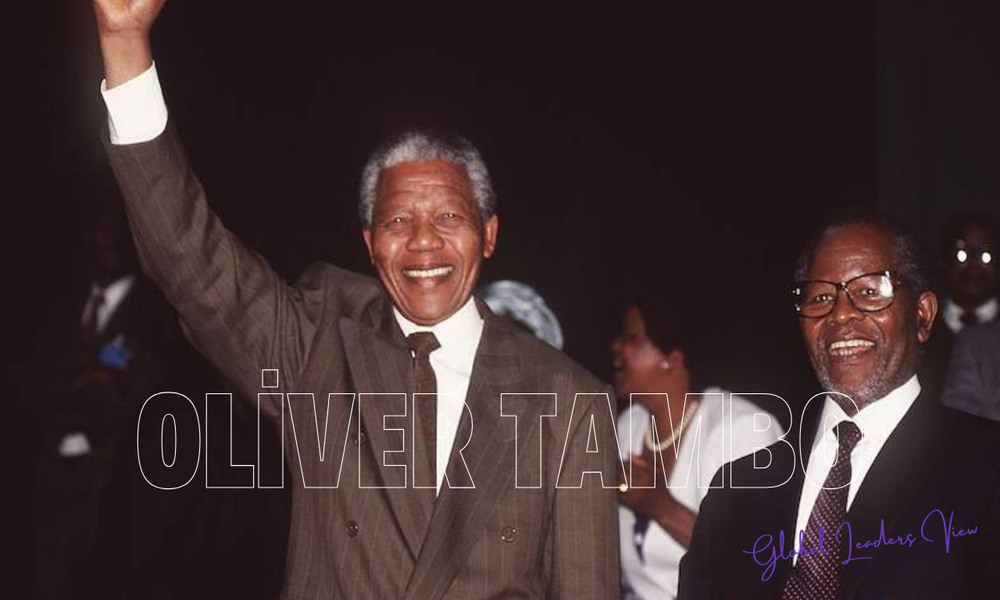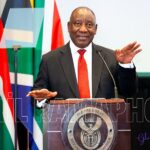Oliver Tambo: A Legacy of Leadership, Struggle and Triumph

liver Reginald Tambo remains one of South Africa’s most pivotal figures in the fight for freedom and justice. His life story is not just that of a political leader, but of a revolutionary who embodied the spirit of resilience, unity, and undying commitment to the cause of ending apartheid in South Africa. As an anti-apartheid revolutionary, he played an instrumental role in galvanizing the international community against the South African regime and provided an unwavering support base for the African National Congress (ANC) during its most trying times.
In this article, we learn the remarkable life of Oliver Tambo, shedding light on his early years, his journey into politics, his leadership within the ANC, and his significant contributions to both South African and global history.
Early Life and Education of Oliver Tambo
Born on October 27, 1917, in the village of Kronkop, in what is now known as the Eastern Cape, Oliver Tambo came from humble beginnings. His parents, Miriam Tambo and Kabelo Tambo, were both members of the Black community who faced the harshness of the apartheid system. His early years were shaped by an environment of racial segregation, and this would influence his later political decisions and his desire to fight for justice.
Tambo’s educational journey began at the St. Peter’s Secondary School in Johannesburg, where he excelled as a student. His brilliance in academics, especially in mathematics, would shape the future path of his life. Later, he moved to Fort Hare University, one of the most prestigious institutions for African education at the time. It was here that Tambo’s political awareness began to take shape.
At Fort Hare, Oliver Tambo met other future leaders, such as Nelson Mandela and Walter Sisulu. This marked the beginning of lifelong friendships and collaborations that would define much of the struggle against apartheid. After his studies, Tambo became involved in student activism, and it was during these years that he began to realize that education alone would not be enough to break the chains of oppression in South Africa.
Political Awakening and Early Activism
Oliver Tambo’s commitment to fighting apartheid began when he joined the African National Congress (ANC) in the late 1940s. His involvement in the ANC’s activities was fueled by his growing awareness of the need for collective action against the discriminatory policies of the South African government. He became closely associated with ANC leaders like Nelson Mandela, Walter Sisulu, and Albertina Sisulu, and together they formed a formidable leadership group.
In 1944, Tambo became one of the founding members of the ANC Youth League, a movement that aimed to invigorate the ANC with a new vision of radical change. It was during this period that the ANC adopted its Defiance Campaign, a response to the increasing racial laws imposed by the National Party government. As the secretary of the Youth League, Tambo helped bring fresh energy to the cause, and his passionate speeches and activism helped rally many people to join the struggle.
The establishment of the ANC Youth League helped lay the groundwork for the ANC’s most significant movements, and Tambo’s organizational and leadership skills shone through in these early years. His decision to prioritize youth engagement was not just about energizing a generation of South Africans, but also about ensuring the long-term survival of the ANC and the struggle for equality.
Exile and International Advocacy
In 1960, following the Sharpeville Massacre, the apartheid government banned the ANC, and its leaders were forced underground. Oliver Tambo, having become one of the ANC’s most vocal and effective leaders, was no exception. In 1962, he went into exile and continued his activism abroad. What followed was a period that saw Tambo becoming the ANC’s most significant international representative.
From his base in Lusaka, Zambia, Tambo dedicated himself to garnering international support for the anti-apartheid movement. He tirelessly traveled across the globe, speaking to world leaders, building alliances, and raising awareness about the injustices faced by the South African people. His diplomatic skills were instrumental in persuading countries to impose sanctions on South Africa and to sever ties with the apartheid regime.
Under Tambo’s leadership, the ANC succeeded in gaining formal recognition by many nations, and in 1973, the organization was granted full membership in the Organization of African Unity (OAU). This was a significant milestone, as it solidified the ANC’s position as the legitimate representative of the South African people in the international arena.
Perhaps one of Tambo’s most notable achievements during this period was his ability to keep the ANC united despite internal and external pressures. His diplomacy, coupled with his steadfast commitment to the ideals of democracy and freedom, ensured that the ANC remained focused on its core mission, despite the setbacks.
Leadership in the ANC and the Fight for Freedom
While in exile, Tambo continued to lead the ANC with unwavering dedication. He worked closely with his colleagues in the organization to coordinate military operations, provide support to anti-apartheid activists in South Africa, and maintain the ANC’s position as the leader of the struggle. Despite the distance from home, Tambo maintained close communication with Nelson Mandela and others incarcerated on Robben Island, continually advocating for their release and for the establishment of a democratic South Africa.
The ANC’s armed wing, Umkhonto we Sizwe (MK), which Tambo helped establish in 1961, carried out various operations against the apartheid regime. Although Tambo never physically participated in military actions, his leadership and direction were crucial in organizing and supporting these efforts.
Tambo’s leadership was defined by his focus on unity and non-racialism. He believed that the liberation of South Africa could only be achieved by fostering solidarity among the country’s diverse racial and ethnic groups. This vision of a non-racial South Africa was central to the ANC’s ideology and was one of the pillars upon which the post-apartheid government was founded.
Return to South Africa and the Legacy of Oliver Tambo
In 1990, following years of isolation, the ANC was unbanned, and Nelson Mandela was released from prison. This historic moment marked the beginning of the end of apartheid. Oliver Tambo, who had tirelessly worked for this day, returned to South Africa in 1991, where he was welcomed as a hero. Although his health was in decline, Tambo continued to contribute to the political process until his passing on April 24, 1993.
Tambo’s legacy lives on, not only in the history of the ANC but also in the post-apartheid South Africa that he helped build. His leadership, vision, and sacrifices laid the foundation for a democratic, inclusive, and non-racial South Africa. Today, he is remembered as one of the foremost architects of the country’s freedom, and his life continues to inspire people around the world who fight for justice, equality, and human rights.
Global Leaders View: The Timeless Influence of Oliver Tambo
Oliver Tambo was more than just a political leader; he was a symbol of resistance, an embodiment of courage, and a champion of freedom. His life’s work remains a testament to the power of resilience in the face of adversity and the unyielding determination to achieve justice.
From his humble beginnings to his leadership role in the ANC, from his exile to his triumphant return, Oliver Tambo’s story is one of triumph against overwhelming odds. His impact on South Africa’s freedom struggle, and the global fight against apartheid, will never be forgotten.
For those looking to learn more about the life and legacy of Oliver Tambo, his leadership in exile, and the historical context of the South African liberation movement, we encourage further exploration of his journey, which continues to resonate as a beacon of hope and determination for future generations.
Recent Posts
Related Articles
Milan Dordevic: Navigating Two Decades of Innovation and Leadership Internationally Across Industries
You’ve got to be serious at some things, at a particular age,...
ByGlobal Leaders ViewFebruary 5, 2025Yossi J Amuial: Steering the Course of Innovation and Excellence at Executive Tag & Title Svcs, Inc.
In the vast sea of leadership, true leaders emerge not by just...
ByGlobal Leaders ViewFebruary 5, 2025Lisa Anna Palmer: A Journey of Empowerment, Vision, and Impact
You can hate more but you can never love less. The hope...
ByGlobal Leaders ViewFebruary 5, 2025Krystn Macomber: From Athlete to Entrepreneur: The Journey of a Visionary CEO
Krystn Macomber knows winning. Going back to her days as a D1...
ByGlobal Leaders ViewFebruary 5, 2025













Leave a comment